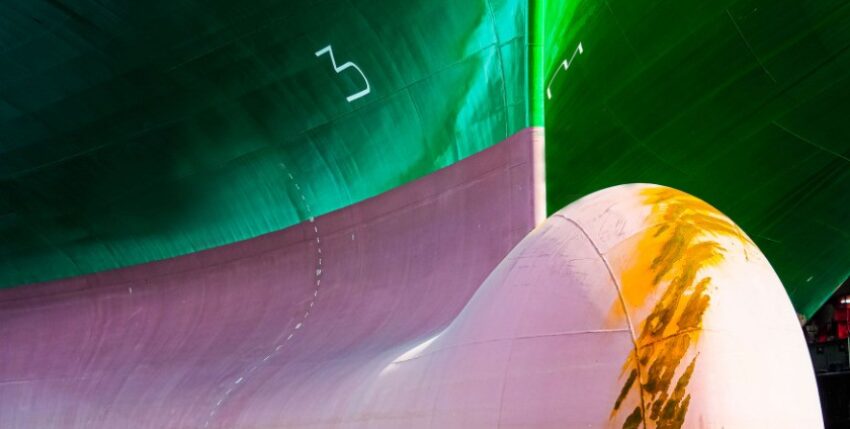Originally planned as a face-to-face event, this year the participants of the Maritime Convention were able to attend the two-part lecture programme on China! Maritime driver for Europe?! via webinar. The DMI hosted the event together with griephan in his customary expert manner.
The key question of the first panel China is a Baltic Sea neighbour? was answered by the Ambassador of the Republic of Singapore to Germany, Mr Laurence Bay, in a reversal of the facts: Germany and the EU are neighbours of the South China Sea. He sees proof of this not only in the presence of European merchant ships in this sea area and in the numerous branches of European companies in this region, more than 2,000 in Singapore alone. The numerous initiatives, such as the connection to the Information Fusion Centre, to which European countries also send personnel, the joint activities against piracy and, ultimately, the availability of anti-Covid-19 vaccines, underpin his position. No physical borders were needed to be part of it. The Southeast Asian states are open to strengthening this cooperation.
This also applies to the marines. At the same time, the ambassador of the city state warned of the limits of such commitments. A strategic logjam should be avoided. Incidents that could lead to uncontrollable reactions were not in the interests of the neighbouring states. Peaceful solutions should be sought. His plea for German and European engagement in Southeast Asia ended with a reference to the fact that in December 2020, the European Union and the Association of Southeast Asian Nations (ASEAN) expanded their relationship into a strategic partnership after almost 45 years of dialogue based on partnership.
The second part of the question Rethink strategic-operational planning! was the approach taken by Captain Sascha-Helge Rackwitz, Office Director of the Head of Department FüSK at the Federal Ministry of Defence, on the basis of the Indo-Pacific Guidelines. In summary, the answer to the question of a stronger maritime presence in the Indo-Pacific region is ultimately also about being a constant partner. However, we should be aware that as such we are also turning the balance screw. Which brought him back to Europe. If the Americans turn to Asia, then "we in Europe have to balance things out".
Change through trade?
In the second panel Dependencies, values & economic success: economic pressure to act? Hanna Müller, Head of Division at the Federal Ministry of the Interior, Building and Community, and Daniel Hosseus, Managing Director of the Central Association of German Seaport Operators (ZDS), crossed swords. The panel was moderated by Dr Sarah Kirchberger, Vice President of the German Maritime Institute. In their exchange, the schism in German positions on China became clear. Here, the sinologist, a long-time expert on the Middle Kingdom due to her activities in the country, presented her personal opinion and took a critical look at the risks posed by China. China is not a value partner, but rather a competitor and a systemic rival. Although Beijing openly faces up to systemic competition, from its point of view it questions the Western system as the rule of capital. In this respect, we remain more or less subtly exposed to threats - up to and including a hybrid threat to our basic democratic order.
On the other hand, companies are probably under too much pressure to succeed or do not seem to want to take note of what is going on around them. China should be integrated as a partner - "trade through change" as a principle that determines action. In an economy that sees itself as self-responsible, risk assessment is sacrificed to competitive pressure.
Some participants at the Maritime Convention may have asked themselves why this divergence exists. It seems that the political actors are not reaching the stakeholders. Is it because some create guidelines without explaining the rationale behind them to others? A better flow of information seems necessary. In the sense of classic military command, the intention of the superior should be better communicated - including better clarification of the methods and instruments used. On the other hand, it should also be noted that the political signals in Europe do not speak a clear language to those driving the economy and trade.
A conclusive answer to the key question - that is not the ultimate goal of the Maritime Convention. However, it did succeed once again in sharpening the picture of the situation by presenting contrasting points of view. It is to be hoped that these considerations will find a wider audience.
The situation of the German Navy
Just like the keynote speeches given by the Inspector of the Navy at the end. At the time of the Maritime Convention, he was in Paris at the Indian Ocean Naval Symposium. An unintentional coincidence, as this is also about maritime security in the Indian Ocean, in which players from South East Asia are at least involved as observers. Rear Admiral Jürgen zur Mühlen, Commander of the Task Forces and Head of the Operations Department at the Naval Command, made the contribution.
Alongside many challenges, there is also good news for the inspector of the navy. After all, the navy is facing the most extensive renewal of its fleet in decades. The 25 million euro proposals for the acquisition of the U212CD, the successor to the P3C Orion, the F 126 frigate, the successor to the fuel supply vessels and the fleet service boats, as well as the extension of the service life of the F 123 frigate passed the parliamentary hurdle in June of this year. Important projects have thus been initiated. In future, the navy will require further modernisation for ESSM Block II, for the development of the F 127 frigate, for the replacement of the mine countermeasure units and the tenders/MUsE. He also had to consider the elimination of obsolescence or the replacement of the first batch of U212, the obsolescence of the F 124 frigate and the sea mine project.
Furthermore, the navy is facing really big problems. As on other occasions, the highest representative of the smallest branch of the armed forces is not afraid to address them publicly as such. Legal requirements that do not take its needs into account take away the navy's room for manoeuvre and place ever more hurdles in its way. Repair and procurement projects are delayed far too often. The fulfilment of the order (repair and procurement) within the agreed time frame does not seem possible (any longer) in the triangle of BAAINBw - industry - navy. The remaining units are fully occupied with the fulfilment of orders in the long term - training for high-intensity combat regularly fails due to the lack of usable gaps in the annual exercise and maintenance plan. It is essential for the navy that the start and end of the shipyard layovers take place as planned, on schedule and with the contractually agreed services. In the eyes of the inspector and his staff, this is a challenge for all parties involved. There is currently a lack of clear procedures, rules and management skills.
Footprint of the Navy
With regard to the new federal government, the course is currently uncertain. There are question marks over the size and financing of the armed forces. It is foreseeable that the pandemic will not remain without an impact on the defence budget. The Navy is trying to make its mark in the development of the coalition agreement. This involves the concretisation and further development of naval shipbuilding as a key technology. In order to increase operational readiness and accelerate procurement and maintenance, the navy wants to push ahead with the system house concept. Together with the other branches of the armed forces, efforts are being made to amend the Soldiers' Working Hours Ordinance (SAZV). The exceptions are to be extended in order to maintain operational readiness.
The inspector of the navy sees "real opportunities for the navy" in the key issues paper, even if it is no longer likely to be the central document due to the upcoming change of government. (Author's note: according to the information available here, the work will be continued in order to bring about decisions on how to proceed once the new federal government has been constituted). The inspector has issued audit mandates in his office. On the one hand, the command organisation is to be adapted in order to identify potential savings (fewer staff, more troops) and to become more effective operationally. Vice Admiral Schönbach can envisage separating the two commands (inspector-commander) into one organisation. He is also pursuing the establishment of a Maritime Warfare Centre and the idea of a Systemhaus See. According to the inspector, the latter in particular is a "thick plank", but initial considerations on the subject of a naval support command - arsenal are already underway.
As far as operational training is concerned, "the ability to fight" is to be emphasised more strongly. In order to create space for more deployment options and a higher operational tempo, the Navy has requested that fewer ships (with the exception of mine countermeasures units) be assigned to NATO units. With the intention of practising multidimensional naval warfare more intensively, opportunities for cooperation with other NATO partners, in particular "docking" with aircraft carrier groups, are being sought.
Helping hands
Turning to the current situation, the inspector emphasised that the navy continues to train, sail and fly even in times of Covid-19 and that all operational and operational training obligations are being met. DEUMARFOR has been established as a multinational command organisation (HRF (M)), the Initial Operational Capability has been certified and Building 15 has been taken over. Within "Operation Helping Hands", around 2,000 naval personnel will be permanently on standby and around 1,100 will be active in internal operations in the course of 2021. The plan is now to increase this figure by 1,040.
Geography matters
Referring to the Indo-Pacific voyage of the frigate "Bayern", the inspector referred to the threat perception in the region. Japan is concerned about the development of China's military budget, which has increased more than tenfold in the last 20 years. In perspective, the 355 Chinese naval units today would become 460 by 2030! Added to this are the provocations in the territorial waters and economic zones of other neighbouring states. In the estimation of many of the countries visited by the frigate "Bayern", Chinese means and intentions are steadily converging, creating a threat situation. Author's note: China's claim to world domination by 2050 has already been formulated.
With this final point, the Navy emphasises the position presented in the second panel by a ministry official, albeit as a personal viewpoint, that China is not only an important trading partner and strategic competitor for us, but also a growing hegemonic power that is pushing into Europe with power and money and putting pressure on the international order. An assessment of China's role that differs significantly from the public perception in Germany.
Annual report
It is a tradition of the Maritime Convention that the annual report of the Naval Command "Facts and Figures on the Maritime Dependency of the Federal Republic of Germany" is published. The annual report is being published for the 34th time. The 184 pages contain information on maritime security, global trade, the global merchant fleet and the German maritime economy. Figures, data and facts illustrate in writing and pictures why the sea is of crucial importance to all our lives. The report presents interrelationships "to make it clear why our country cannot avoid protecting its maritime interests," says the Inspector of the Navy.
+++++








2 responses
Thanks for the comprehensive review!
What do you mean, no comment?
No need for discussion?